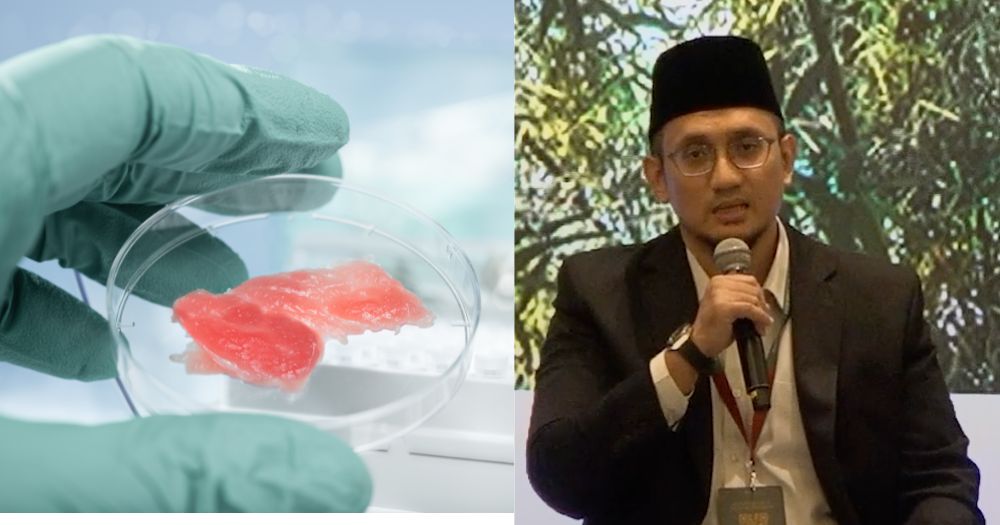It is generally permissible (halal) for cultivated meat to be consumed by Muslims, assuming the right conditions are fulfilled, found the Fatwa Committee of Singapore.
A fatwa was issued on Feb. 3, in tandem with the two-day Conference on Fatwa in Contemporary Societies 2024, hosted by the Islamic Religious Council (Muis) in Singapore.
Which cultivated meats are halal?
The following conditions must be fulfilled to ensure that cultivated meat is halal for consumption:
- Cell source must be taken from animals that are halal to consume.
- Every ingredient that makes up texture and composition of cultivated meat must be halal.
- Product is non-toxic and clean.
Before any products in Singapore can be halal-certified, Muis is working to develop guidelines on the halal certification of cultivated meat.
It would first need to consult with various stakeholders such as the Singapore Food Agency and industry players, and the timeline of the certification process is dependent on the complexity involved in certifying the products.
What is cultivated meat?
In cultivated meat, the cells are derived from animal tissue and typically grown in a nutrient-rich broth.
Unlike other protein alternatives like plant-based meat, cultivated meat is actual meat that is derived from animal cells.
During a plenary about cultivated meat at the conference, SciTech specialist Maanasa Ravikumar from the the Good Food Institute (GFI) highlighted the impacts of traditional animal rearing on the environment.
Data from the United Nations indicate that between 14.5 per cent to over 20 per cent of all anthropogenic greenhouse gas emissions come from industrial animal agriculture, said Ravikumar.
"To put this into context, this is greater than the entire transportation sector combined in the world. Every car, every bus, every train."
About 75 per cent of the world's agricultural land is dedicated to feeding livestock.
As the global population burgeons, to sustain the planet and our food demand, Ravikumar believes diversifying protein sources is the way to go.
Cultivated meat, if done using renewable energy, can lower emissions of meat production by around 90 per cent, according to a study done by a GFI and a consultancy group.
Cultivated meat in Singapore
Singapore is one of the leading markets for lab-grown meat, like chicken, pork, and seafood.
In 2020, the Singapore Food Agency (SFA) approved the sale of cultivated meat products.
Muis said there is a "global impetus" for alternative sustainable food solutions and therefore found it "essential" to develop a religious guidance in response to questions of its permissibility for Muslim consumption.
While the field of cultivated meat is still developing, it is "necessary" to have a clear religious position early on the permissibility of consumption of such foods.
Muis also stated that the fatwa on cultivated meat is underpinned by two Islamic principles — preserve human life and to protect the environment.
"Allah encourages us to conserve our resources and also preserve the environment. Not only for the usage of today's lives, but also for future generations", shared deputy Mufti Ustaz Izal Mustafa Kamar.
Cultured meat has the "potential" to address environmental concerns by "reducing the ecological footprint associated with traditional farming methods".
This is also not the first time the committee has issued a fatwa related to environment protection, he added.
The Fatwa Committee has previously issued fatwas about usage of paraffin for recycled plastic in food packaging, alternative protein sources, and plant-based protein.
Taking a "proactive stance"
Izal explained that the committee made a "strategic" choice to provide guidance early regarding an industry that is not yet mature.
As the market for cultured meat is not yet fully developed, some might advocate for a more "cautious approach" which would ensure a better understanding of its challenges, benefits and implications, Izal shared.
However, the Fatwa Committee took a "proactive stance" to offer guidance and support at early stages of development.
This is because it believes that industries require support from the government, the general public, and in particular, the religious authorities for food products, in order to progress.
Committee will monitor the cultivated meat industry
To reach this decision, the Fatwa Committee conducted an internal review of existing literature on novel food and cultivated meat and consulted various stakeholders. It also visited a local manufacturing facility that makes cultivated meat to have a first-hand view of how it is produced.
Izal revealed that things might change in the future, based on feedback from the general public and further research in the domain.
"As technology evolves and progresses, there may be a necessity to further refine these positions in the future," he added.
He emphasised that the fatwa committee hopes to provide guidance so the industry can progress and innovate, and this fatwa reflects the committee's "forward looking approach".
Top images via Canva.

If you like what you read, follow us on Facebook, Instagram, Twitter and Telegram to get the latest updates.



